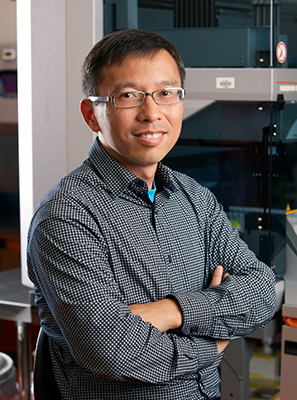Biography
Research Interests
Focus
- Investigating low dose radiation induced cancer development
- Combining radiation therapy with immune checkpoint therapy
- Identifying radiation induced biomarkers for biodosimetry.
Research program
The effect of radiation on healthy individuals depends on the total dose and dose rate of irradiation exposure. High-dose radiation (such as conventional radiotherapy), given acutely at a high-dose rate, is generally considered to be detrimental, causing apoptosis, DNA damage, and suppressing the immune and hematopoietic systems. Unlike conventional radiotherapy, several recent studies suggest that low dose radiation is more effective in cancer treatment than conventional radiotherapy and is found to correlate with the stimulation of immune system. We are investigating the effects of low dose radiation on the cancer development, and exploring its role in cancer treatment.
Postdoctoral fellows and students who are interested are encouraged to contact Dr. Yi Wang
Selected publications
- Kourouniotis G*,Wang Y*, Pennock S, Chen X, Wang Z (2016). Non-ligand-induced dimerization is sufficient to initiate the signalling and endocytosis of EGF receptor. International Journal of Molecular Sciences, 17(8): 1200 (*equal contribution)
- Greer SN, Metcalf JL, Wang Y, and Ohh M. (2012). The updated biology of hypoxia-inducible factor. The EMBO Journal, 31(11): 2448-2460
- Wang Y, Roche O, Xu CY, Moriyama EH, Heir P, Chung J, Roos F, Chen E, Finak G, Milosevic M, Wilson BC, Teh B, Park M, Irwin M, and Ohh M. (2012). Hypoxia promotes ligand-independent EGFR signalling via HIF-mediated upregulation of caveolin-1. Proceedings of the National Academy of Sciences, 109(13): 4892-4897
- Wang Y and Ohh M. (2010). Oxygen-mediated endocytosis in cancer. Journal of Cellular and Molecular Medicine, 14(3):496-503.
- Wang Y, Roche O, Yan M, Finak G, Evans AJ, Metcalf JL, Hast BE, Hanna SC, Wondergem B, Furge KA, Irwin MS, Kim WK, Teh BT, Grinstein S, Park M, Marsden PA, and Ohh M. (2009). Regulation of endocytosis via the oxygen-sensing pathway. Nature Medicine, 15(3):319-24.
